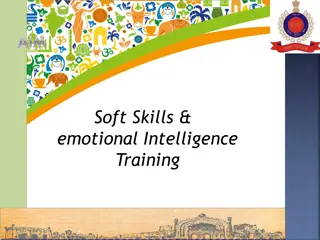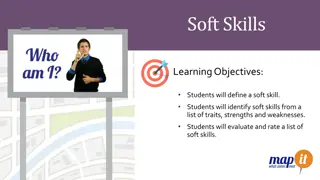Unveiling the Power of Soft Skills in Professional Success
Soft skills play a crucial role in enabling individuals to interact effectively and achieve their goals. The types of soft skills, including communication, leadership, influencing, interpersonal, and personal skills, highlight the diverse abilities needed to navigate today's dynamic work environments successfully.
Download Presentation

Please find below an Image/Link to download the presentation.
The content on the website is provided AS IS for your information and personal use only. It may not be sold, licensed, or shared on other websites without obtaining consent from the author.If you encounter any issues during the download, it is possible that the publisher has removed the file from their server.
You are allowed to download the files provided on this website for personal or commercial use, subject to the condition that they are used lawfully. All files are the property of their respective owners.
The content on the website is provided AS IS for your information and personal use only. It may not be sold, licensed, or shared on other websites without obtaining consent from the author.
E N D
Presentation Transcript
The Gender of Entrepreneurship - Empowering Women for A Better Future Yerevan, Armenia 2019
WHAT ARE SOFT SKILLS? personal attributes that enable someone to interact effectively and harmoniously with other people; a combination of people skills, social skills, communication skills, character traits, attitudes, career attributes, social intelligence and emotional intelligence quotients among others that enable people to navigate their environment, work well with others, perform well, and achieve their goals with complementing hard skills.
TYPES OF SOFT SKILLS
COMMUNICATION SKILLS Verbal Communication Body Language Physical Communication Writing Storytelling Visual Communication Humor Quick-wittedness Listening Presentation Skills Public Speaking Interviewing
LEADERSHIP Team Building Strategic Planning Coaching Mentoring Delegation Dispute Resolution Diplomacy Giving Feedback Managing Difficult Conversations Decision Making Performance Management Supervising Managing Manager Management Talent Management Managing Remote Teams Managing Virtual Teams Crisis Management
INFLUENCING Facilitation Selling Inspiring Persuasion Negotiation Motivating Collaborating
INTERPERSONAL SKILLS Networking Interpersonal Relationships Dealing with Difficult People Conflict Resolution Personal Branding Office Politics
PERSONAL SKILLS Emotional Intelligence Self Awareness Emotion Management Stress Management Tolerance of Change and Uncertainty Taking Criticism Self Confidence Adaptability Resilience Assertiveness Competitiveness Self Leadership Self Assessment Work-Life Balance Friendliness Enthusiasm Empathy
CREATIVITY Problem Solving Critical Thinking Innovation Troubleshooting Design Sense Artistic Sense
PROFESSIONAL SKILLS Organization Planning Scheduling Time Management Meeting management Technology Savvy Technology Trend Awareness Business Trend Awareness Research Business Etiquette Business Ethics Diversity Awareness Disability Awareness Intercultural Competence. Training Train the Trainer Process Improvement Knowledge Management. Writing Reports and Proposals Customer Service Entrepreneurial Thinking.























